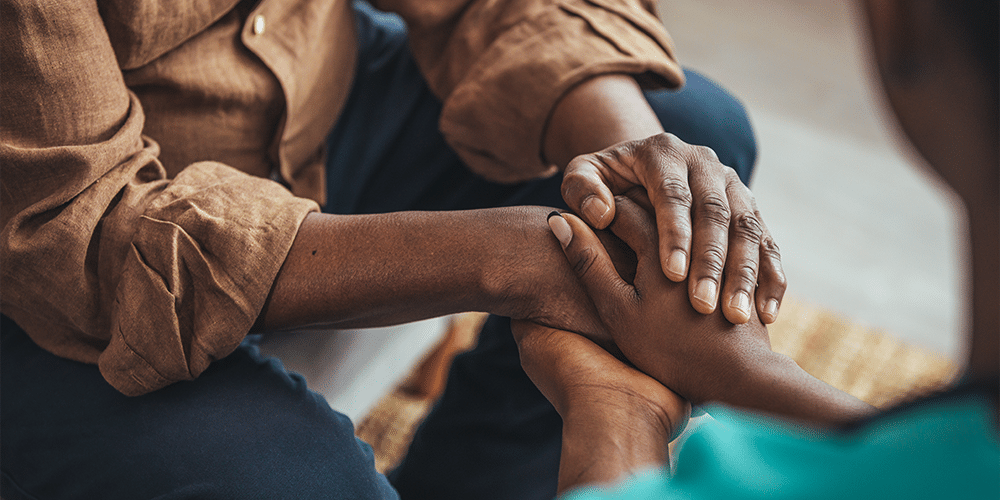
Navigating Grief & Loss
Hope Grows specializes in Caregiving and Grief, Bereavement and Loss. We are here for you during any part of your journey. Contact [email protected] or call 412-369-4673 to talk with someone.
Explore National and Local Resources
National Resources
Local Resources
Common FAQ’s about Loss, Grief and Hospice

What is loss?
Loss – the real or perceived deprivation of something that is deemed as meaningful. A loss can be death related or nondeath related.
What is Grief?
Grief – the normal and natural reaction to loss, any loss.
What is Mourning?
Mourning – the process that one goes through in adapting to the death of a person
What is Bereavement?
Bereavement – defines the loss to which the person is trying to adapt and the experience of having lost someone close.
What is Hospice?
Hospice Care is end of life care that occurs when doctors believe there are six months of less left to live. Hospice Care is used to help with pain and symptoms management, emotional support, and coaching for caregivers. Click here to read more
What is Palliative Care?
Palliative Care is the management and treatment of other needs while working to decrease pain, stress and discomfort. With Palliative Care curative options are still available and can be used in conjunction with care.
Are there phases/stages of grief?
There are many different theories with how people grieve a loss. At Hope Grows, we help people through Acceptance, Processing of the Pain, Adjusting to the Loss and Finding an Enduring Connection with the Deceased while Embarking on a New Life.
Why do we grieve the way that we do?
We grieve based on quite a few factors. Who the person was that died, the health of the attachment with the person, how the person died, how we grieved in the past, our personality, how we problem solve and cope with life changes, social variables and concurrent stressors.
How is grief experienced?
There are many ways in which grief can be experienced. We can be affected emotionally, cognitively, physically, spiritually, socially, economically and behaviorally.
What are some misconceptions about grief?
People may find it too painful to talk about their loss, crying indicates someone is not coping well, the grieving process should last about one year, quickly putting grieving behind will speed the process of healing, and understanding the stages/phases of grief will help someone to heal faster and that time heals all wounds.
Do people every get over a loss?
No, we do not every forget or get over a loss. However, the deep pain of loss gets better over time as we allow the healing to happen.
How long will my grief last?
Every person’s journey with grief is different. Some people feel better after a few weeks and some people may take months or years. There is no correct way to grieve, but taking the time to fully process your grief may make it easier to heal.
What if I feel stuck?
During the grieving process, some days are better than others and that’s okay. If you start to begin using substances to cope, feeling so depressed or anxious that daily living is difficult, or feeling like ending your life, it IS time to get professional help.
How do I talk to a child about death and grief?
Children just want someone to tell the truth. Be honest, clear and gentle about what is or has happened. Try to avoid using euphemisms like “going to sleep” because this has the potential to be even more confusing for the child and even fear inducing. Be mindful of how the developmental stage of the child could impact their understanding of death and fear of losing others. Contact Hope Grows to help guide you.
Is it possible to lose my faith or purpose and meaning in life?
Yes, this is experiencing the loss spiritually. Loss can stir up many emotions and cause us to question everything we know. We may begin wondering why bad things happen to good people? Why did this happen to me? Or how do I honor the legacy of my loved one? Regular rituals such as attending church services, prayer or doing activities your loved one enjoyed can be great ways to honor their legacy and cope with their loss. It can also be helpful to seek the support of religious or spiritual figures, peers, or a counselor to help you process how you are feeling after the loss.
What is anticipatory grief?
It can be helpful to find another person like a friend, relative or counselor to help process the feelings that are coming up, maintain hope, and prepare for the death.
How do I help someone that is experiencing a loss?
When someone confides in us about losing a loved one it can be difficult to know what to say. We may be dealing with our own discomforts around the topics of death, dying, and losing our loved ones. Here is a list of helpful and not so helpful things to say to someone who is grieving.
(I’m not sure I want to put these links)
- Read about these questions and more here

